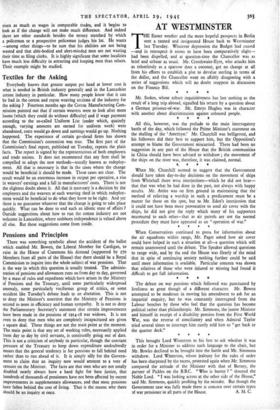AT WESTMINSTER
THE Easter weather and the more hopeful prospects in Berlin sent a tanned and invigorated House back to Westminster last Tuesday. Whatever depression the Budget had caused —and in retrospect it seems to have been comparatively slight— had been dispelled, and at question-time the Chancellor was as brief and urbane as usual. Mr. Crosthwaite-Eyre, who attacks him as relentlessly as a sparrow does a coconut, got no change at all from his efforts to establish a plot to devalue sterling in terms of the dollar, and the Chancellor went on affably disagreeing with a series of suggestions which will no doubt reappear in discussion on the Finance Bill.
* * * * Mr. Stokes, whose robust inquisitiveness has lost nothing as the result of a long trip abroad, signalled his return by a question about a German prisoner-of-war. Mr. Emrys Hughes was in character with another about discrimination against coloured people. * * * *
All this, however, was the prelude to the main interrogatory battle of the day, which followed the Prime Minister's statement on the shelling of the ' Amethyst.' Mr. Churchill was belligerent, and
his followers did their best to support him, but the Opposition's attempt to blame the Government miscarried. There had been no suggestion in any part of the House that the British communities in China should have been advised to withdraw ; the movement of the ships on the river was, therefore, it was claimed, normal.
* * * *
When Mr. Churchill seemed to suggest that the Government should have taken day-to-day decisions on the movement of ships from Whitehall there were interjections—which he did not hear— that that was what he had done in the past, not always with happy. results. Mr. Attlee was on firm ground in maintaining that the method of relieving a warship in such a predicament must be a matter for those on the spot, but to Mr. Eden's interjection that it could not have been more provocative to send air cover with the
ships, he did not give the reply which many of his supporters murmured to each other—that as air patrols are not the normal procedure they must have appeared as an " operation of war." * * * * When Conservatives continued to press for information about the air squadrons within range, Mr. Paget asked how air cover could have helped in such a situation at all—a question which will remain unanswered until the debate. The Speaker allowed questions
to range wide, and by the end the House was clearly of the mind that in spite of continuing anxiety nothing further could be said until more information is available. Particular concern was shown that relatives of those who were injured or missing had found it difficult to get full information.
* * * * The debate on war pensions which followed was punctuated by liveliness as great though of a different character. Mr. Bowen attempted to be moderate in moving his amendment to ask for an impartial enquiry, but he was constantly interrupted from the Labour benches by those who feel that the question has become political rather than philanthropic. Mr. Simmons, the junior Minister and himself in receipt of a disability pension from the First World War, was the reverse of conciliatory and when Admiral Taylor tried several times to interrupt him curtly told him to " get back to the quarter deck." * * * * This brought Lord Winterton to his feet to ask whether it was in order for a Minister to address such language to the chair, but Mr. Bowles declined to be brought into the battle and Mr. Simmons withdrew. Lord Winterton, whose jealousy for the rules of order has been sharpened by the recess, protested again when Mr. Simmons compared the attitude of the Minister with that of Barney, the partner of Pickles on the B.B.C. " Who is barmy ? " shouted the Noble Lord. " I was looking across at the other side of the House," said Mr. Simmons, quickly profiting by the mistake. But though the Government case was fully made there is concern over certain types of war pensioner in all parts of the House. A. M. C.


































 Previous page
Previous page